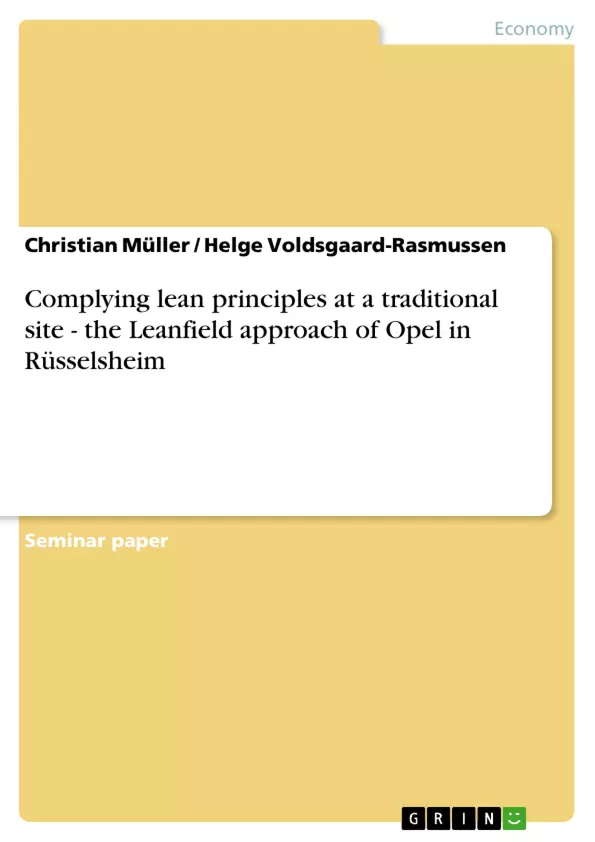The purpose of this paper is to evalua te the decision of Adam Opel AG to restructure its production site at Rüsselsheim according to the so-called Leanfield approach. Therefore, a theoretical framework containing key principles of lean production and pointing out the importance of cooperation as a prerequisite for their implementation has been built up. Then the steps that led to the formulation of lean principles at General Motors, Opel’s mother company and the realization of the Leanfield approach in Rüsselsheim are examined. The results are that Opel succeeds in complying with lean principles in the new Rüsselsheim assembly plant but that the Leanfield approach can not be perceived as generally applicable solution as it was due to the specific circumstances Opel faced at the existing Rüsselsheim site.
2 Motivation
As the automotive industry is heavily dependant on effective manufacturing and supply processes to create advantages in an environment of intensive competition, future trends in logistics and supply chain management are likely to evolve in this industry.
Therefore, we chose the restructuring of the Opel plant at Rüsselsheim to examine a novel approach to implement lean manufacturing at a traditional production site.
Inhaltsverzeichnis (Table of Contents)
- Executive Summary
- Motivation
- Background
- The situation of Opel
- Opel Company Profile
- Numbers
- Rüsselsheim
- The development of car production
- Lean Production
- Brownfield and Greenfield
- The situation of Opel
- Purpose
- Method
- Theory
- Empirical investigation
- Greenfield, Brownfield or Leanfield
- Development of plant concepts at General Motors
- NUMMI
- CAMI
- Eisenach
- Rosario/Argentina
- Gliwice/Poland
- Rüsselsheim
- Elements of Leanfield's realization
- Conceptual matters
- Architecture
- Quality control
- Business Mall
- Implementation matters
- Simulation
- Cooperation of workers
- Training
- Conceptual matters
- Analysis
- Conclusion
Zielsetzung und Themenschwerpunkte (Objectives and Key Themes)
This paper examines the decision of Adam Opel AG to restructure its production site in Rüsselsheim using the Leanfield approach. It analyzes the theoretical framework of lean production, emphasizing the importance of cooperation for successful implementation. The paper traces the evolution of lean principles within General Motors and examines the realization of the Leanfield approach in Rüsselsheim.
- Implementation of lean production principles in a traditional manufacturing environment.
- The role of cooperation and collaboration in successful lean implementation.
- The development of lean principles at General Motors and its application in the Leanfield approach.
- The specific circumstances and challenges faced by Opel in Rüsselsheim.
- The effectiveness and limitations of the Leanfield approach.
Zusammenfassung der Kapitel (Chapter Summaries)
- Executive Summary: Provides an overview of the paper's purpose, methodology, and key findings. It highlights the successful implementation of lean principles at the new Rüsselsheim plant but acknowledges that the Leanfield approach may not be universally applicable.
- Motivation: Emphasizes the importance of effective manufacturing and supply processes in the automotive industry due to fierce competition. The paper focuses on the restructuring of the Opel plant in Rüsselsheim as a case study of a novel approach to lean manufacturing implementation.
- Background: Introduces Opel as a subsidiary of General Motors and outlines its key functions and market presence. The section provides details on Opel's financial performance, manufacturing sites, and the specific challenges faced by the Rüsselsheim plant.
- The development of car production: Discusses the evolution of management concepts in the automotive industry, focusing on the significance of Just-in-Time (JIT) and Lean Production. It traces the development of these concepts from their origins in Japan to their wider adoption in the industry.
- Purpose: States the clear objective of the paper: to evaluate the decision of Opel to adopt the Leanfield approach at its Rüsselsheim site.
- Method: Outlines the research methodology employed in the paper.
- Theory: Presents the theoretical framework underpinning the analysis, exploring the key principles of lean production and the importance of cooperation in its implementation.
- Empirical investigation: Examines various General Motors plant concepts, including Greenfield, Brownfield, and Leanfield approaches, and their application in different locations. This section delves into the specific implementation details of the Leanfield approach in Rüsselsheim.
- Analysis: Provides a detailed analysis of the Leanfield approach, examining its benefits and limitations, and the specific context in which it was applied at the Rüsselsheim plant.
Schlüsselwörter (Keywords)
This paper focuses on lean production, Leanfield approach, automotive industry, manufacturing, supply chain management, cooperation, restructuring, Opel, General Motors, Rüsselsheim, Germany. These keywords encapsulate the core concepts, research focuses, and important themes explored in the text.
Frequently Asked Questions
What is the "Leanfield approach" used by Opel?
The Leanfield approach is a restructuring strategy used to implement lean production principles at existing, traditional manufacturing sites like Opel Rüsselsheim.
How does Leanfield differ from Greenfield and Brownfield?
Unlike Greenfield (building from scratch) or Brownfield (reusing old sites with limitations), Leanfield focuses on a comprehensive lean redesign of an established traditional plant.
What are the key principles of lean production?
Key principles include Just-in-Time (JIT) manufacturing, quality control, waste reduction, and the essential cooperation of workers.
Why was cooperation important for Opel's restructuring?
Lean principles rely heavily on the collaboration and training of the workforce to ensure quality and efficient process simulation.
Is the Leanfield approach a universal solution?
The study concludes that while successful in Rüsselsheim, it may not be universally applicable as it was tailored to Opel's specific local circumstances.
- Quote paper
- Christian Müller (Author), Helge Voldsgaard-Rasmussen (Author), 2004, Complying lean principles at a traditional site - the Leanfield approach of Opel in Rüsselsheim, Munich, GRIN Verlag, https://www.grin.com/document/31739



